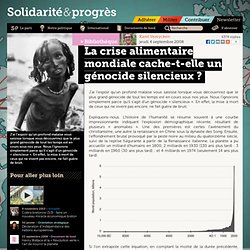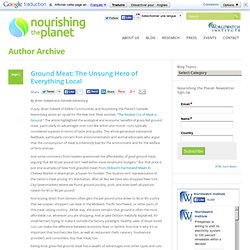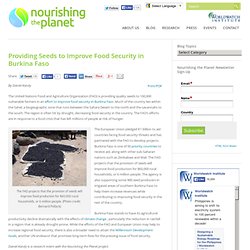

Ong's. Solidarité & Progrès - La crise alimentaire mondiale cache-t-elle un génocide silencieux ? J’ai l’espoir qu’un profond malaise vous saisisse lorsque vous découvrirez que le plus grand génocide de tout les temps est en cours sous nos yeux.

Nous l’ignorons simplement parce qu’il s’agit d’un génocide « silencieux ». En effet, la mise à mort de ceux qui ne vivent pas encore, ne fait guère de bruit. Expliquons-nous. L’histoire de l’humanité se résume souvent à une courbe impressionnante indiquant l’explosion démographique récente, résultant de plusieurs « anomalies ». Une des premières est certes l’avènement du christianisme, une autre la renaissance en Chine sous la dynastie des Song. Si l’on extrapole cette équation, en comptant la moitié de la durée précédente, pour ajouter un milliard d’hommes sur terre, le chiffre de 5 milliards aurait du être atteint en 1981 (7 ans après 1974) ; 6 milliards en 1985 (4 ans plus tard) et 7 milliards en 1987 (2 ans plus tard).
Cela n’a pas eu lieu. Pourquoi Pol Pot ou « Hitler light » ? Alors, est-ce que nous accusons l’ONU d’être génocidaire ? Nourishing the Planet at Green Week in Brussels. Danielle Nierenberg. Share By Brian Halweil and Danielle Nierenberg In July, Brian Halweil of Edible Communities and Nourishing the Planet’s Danielle Nierenberg wrote an op-ed for The New York Times entitled, “The Kindest Cut of Meat is Ground.”

The article highlighted the ecological and economic benefits of grass-fed ground meat, particularly its advantages over cuts like sirloin and round—cuts typically considered superior in terms of taste and quality. The article generated substantial feedback, particularly concern from environmentalists and animal advocates who argue that the consumption of meat is inherently bad for the environment and for the welfare of farm animals. And some comments from readers questioned the affordability of good ground meat, arguing that $8.50 per pound isn’t “well within most Americans’ budgets.”
Eating local, grass-fed ground meat has a wealth of advantages over other types and cuts of meat. Providing Seeds to Improve Food Security in Burkina Faso. 0inShare Share By Daniel Kandy The United Nations Food and Agriculture Organization (FAO) is providing quality seeds to 100,000 vulnerable farmers in an effort to improve food security in Burkina Faso.

Much of the country lies within the Sahel, a biogeographic zone that runs between the Sahara Desert to the north and the savannahs to the south. The region is often hit by drought, decreasing food security in the country. The FAO projects that the provision of seeds will improve food production for 860,000 rural households, or 6 million people. The European Union pledged €1 billion to aid countries facing food security threats and has partnered with the FAO to develop projects. Burkina Faso stands to have its agricultural productivity decline dramatically with the effects of climate change , particularly the reduction in rainfall in a region that is already drought-prone.
Un sixième de l’humanité souffre de la faim. Les supermarchés et la crise alimentaire mondiale par Esther VIVAS. La crise alimentaire a laissé sans nourriture des millions de personnes dans le monde. Au chiffre de 850 millions de personnes souffrant de la faim, la Banque mondiale en a ajouté 100 de plus suite à la crise actuelle. Ce « tsunami » de la famine n’a rien de naturel, il est au contraire le résultat des politiques néolibérales imposées depuis des décennies par les institutions internationales. Aujourd’hui, le problème n’est pas le manque d’aliments en quantités suffisantes mais bien l’impossibilité d’y avoir accès, du fait des prix élevés.
Cette crise alimentaire laisse derrière elle une longue liste de gagnants et de perdants. Parmi les plus affectés on retrouve les femmes, les enfants, les paysans expulsés de leurs terres, les pauvres urbains... La chaîne agro-alimentaire est contrôlée à chaque étape (semences, fertilisants, transformation, distribution, etc) par des multinationales qui accumulent des bénéfices élevés grâce à un modèle agro-industriel libéralisé et dérégulé.